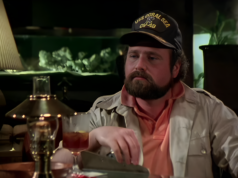A cranky old man’s complaining about “the internets” is one thing. But when the argument is coming from a tech guru who once promoted the virtues of digital piracy, you’ve got a whole ’nother story.
In his new book, You Are Not a Gadget, musician and avant-garde computer scientist Jaron Lanier examines the downsides to the internet’s free culture, according to a new New York Times review. He calls artists the “new peasants,” saying that by freely sharing their work, they have undermined not only the traditional media that once allowed artists to be paid for contributing creatively to society but also themselves. And even their art.
He rages against “hive thinking” and “digital Maoism”: in other words, “the glorification of open-source software, free information, and collective work at the expense of individual creativity.”
The Times article says, Lanier “blames the web’s tradition of ‘drive-by anonymity’ for fostering vicious pack behavior on blogs, forums, and social networks. He acknowledges the examples of generous collaboration, like Wikipedia, but argues that the mantras of ‘open culture’ and ‘information wants to be free’ have produced a destructive new social contract.
“ ‘The basic idea of this contract,’ he writes, ‘is that authors, journalists, musicians, and artists are encouraged to treat the fruits of their intellects and imaginations as fragments to be given without pay to the hive mind. Reciprocity takes the form of self-promotion. Culture is to become precisely nothing but advertising.’ ”
Scary.
Lanier differs slightly from some other tech wonks. He sees the stifling of new technologies by monopolies (Google, YouTube) as a root cause of the problem. Others, though, such as the University of Texas-Dallas’ Stan Liebowitz, says intellectual piracy is to blame.
What else is to blame for the fact that there hasn’t been a next Dave Matthews or next White Stripes, two artists that rose to popularity at the beginning of the internet/iTunes boom?
“It’s as if culture froze just before it became digitally open, and all we can do now is mine the past like salvagers picking over a garbage dump,” Lanier writes.
In theory, the Times article says, “public officials could deter piracy by stiffening the penalties, but they’re aware of another crucial distinction between online piracy and house burglary: There are a lot more homeowners than burglars, but there are a lot more consumers of digital content than producers of it.
“The result,” the story continues, “is a problem a bit like trying to stop a mob of looters. When the majority of people feel entitled to someone’s property, who’s going to stand in their way?”
33












This.
Technically, only semi-free.